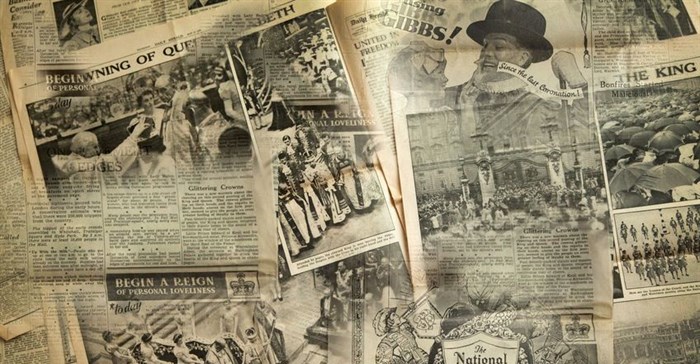The Audit Bureau of Circulations recently reported that, overall, consumer magazine circulations grew over the past year by just under 3%, which isn’t too bad considering that they fell 11.7% in the 4th quarter of 2016 from the same period in 2015.

There was some good growth with a few publications, but not many. Over 10 years, broadly speaking, magazines have seen their circulations slashed by half. Newspapers, unfortunately, fared worse, with substantial decreases in copy sales announced.
[Publishing is not for the faint-hearted. You have to have deep pockets and lots of Valium.]
Of course, this means more commentators are saying (yawn), yet again, that it brings us closer to the end of print. Well, of course it doesn’t.
What many fail to do is recognise the importance of readership over circulation. Obviously the two are inextricably linked but a fall in circulation does not mean an equal fall in readership. Sadly, the powers that be in advertising have killed-off the only way we had of comparing those two figures now that Amps has gone. So, apart from some brave (perhaps naïve) efforts, the industry is groping around in the dark.
But what is the reason that print (and other media) are losing numbers?
Well sure, you can blame the internet, because that’s fairly obvious. But there’s also the cost – in terms of time and money. Increasing numbers of people have less of both.
A jolly good friend of mine wrote an article recently (helping me to put a paper together for an industry presentation), and this is what he said:
As a former newspaper journalist, my morning and Sunday newspapers have been a lifelong addiction. But alas, now I have to say goodbye to my last newspaper subscription as this habit has finally become an unsustainable and completely unnecessary indulgence.
Quite simply, paying more than R1,000 a year just doesn’t make sense for a daily newspaper that sometimes arrives at my door and sometimes doesn’t; that unfolds as a soggy mess in the rainy season. Its Sunday equivalent has become entirely predictable in its content. Which, more often than not, results in an apology the following week for being wrong.Newspapers the world over are losing subscribers right, left and centre, mostly because their content is either unreliable, late, old news or designed to be controversial enough to attract readers. Trouble is, readers are getting tired of badly researched stories, fake news, one-sided commentaries. Not to mention grammar that defies all logic.
Fewer and fewer untrained and unskilled journalists are being relied upon by their cash-strapped, paranoid bosses, to produce news for the sake of producing news, with the hope that somehow in the future, readers will come flocking back by some quite incredible miracle.
The online environment is quicker, cheaper and diverse enough for one to be able to separate the truth from fake news quickly and efficiently, and has exacerbated the plight of newspapers.In South Africa, there are still a few good newspapers – the Mail & Guardian being one worth mentioning. Trouble is, it costs an arm and a leg – out of the reach of many a pensioner, not to mention an increasingly impoverished middle class.
But it was not only the cost of newspapers that has finally put me off them but the fact that I suddenly realised my Sunday newspaper, which for years I could count on to keep me enthralled for hours, only managed to keep me occupied for no more than 15 minutes at best, as I cherry-picked the only stories worth reading.
Meanwhile, my addiction to news is being well fed for hours every day by the likes of News24, BBC, the New York Times online, BizNews.com, the Daily Maverick, BusinessLive and a host of other outstanding online resources which are free, up to the point of my wanting to download something in depth, and for which I am happy to pay.
Of course, something else that has put me off newspapers is the depressing transition of the once-famous Argus group into the money-obsessive, asset-stripping monster called Independent News & Media under the greedy grip of Tony O’Reilly and now a slow degeneration into an egoistic platform for Iqbal Survé.
There are many journalists in the newspaper industry that will not like what I am saying. Who think I am being some sort of traitor to keep harping on about how the printed newspaper to news dissemination is like the Beta videotape to TV storage. But the fact is that as an ardent newspaperman, with ink still coursing through my veins, I have finally given up the battle against my conscience and kicked my last, expensive newspaper subscription renewal into touch. It’s a sad day for me. But I will get over it.
I do agree with his comment about deteriorating standards of reporting – mainly as a result of budget slashing – and I cringe when I read some of the commentary these days.
But print is not going to die.
It may have to do some moderate re-inventing of itself, but I see newspapers and magazines being around for a very, very long time – with some really good columnists like Justice Malala, Tom Eaton, Darrell Bristow-Bovey, David Biggs, Wendy Knowler, Andrea Burgener, Jonathan Jansen and many others who are a delight to read.
Of course, there’s a bizarre twist in accountancy rules, which must cheer up a lot of publishers. What they really want to do is get readership up without having to print so many of their publications. It’s actually more profitable. Ponder on that for a moment.
So no, don’t start preparing eulogies for print media yet. All it needs is better writers and more Sudoku puzzles.











